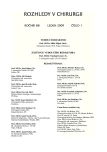-
Medical journals
- Career
Mid-term Outcomes and Survival Rates in Patients with Radical Retropubic Prostatectomy (RRP) Under Current Czech Healthcare System
Authors: L. Šafařík 1; R. Bílek 2; J. A. Víšek 3; K. Novák 1; J. Ťuíková 1; Martin Pešl 1; J. Stolz 1; J. Dvořáček 1
Authors‘ workplace: Urologická klinika 1. LF UK a VFN Praha, přednosta prof. MUDr. J. Dvořáček, DrSc. 1; Endokrinologický ústav Praha, přednosta doc. MUDr. V. Hainer, CSc. 2; Fakulta sociálních věd UK, CESES FSV UK, děkan prof. RNDr. J. A. Víšek, CSc. 3
Published in: Rozhl. Chir., 2009, roč. 88, č. 1, s. 21-26.
Category: Monothematic special - Original
Overview
The mid-term results (5 yr) after radical retropubic prostatectomy (RRP) are outlined and compared with pre - and postoperative parameters of patients. While 5 years survival could be expected in as many as 92.4%, relatively higher age (majority over 65) brings a higher risk of complications with it, though fully comparable with international standards. No perioperative mortality was recorded (0%), obstructive symptoms post-operatively developed in 13.4% patients, who were subsequently managed successfully endoscopically. Continence with maximum one pad per 24 hours was recorded in 77.2%, the severe incontinence was only in 3.3%. Spontaneous erection was reported in 4.3%, but except for higher age, the other objective factors were involved.
Key words:
radical prostatectomy – prostate cancer – survival – complications
Sources
1. Aktuální informace č. 59/2007, ÚZIS ČR, s. 3.
2. Eastham, J. A., Scardino, P. T. Radical prostatectomy. In: Campbell‘s Urology, 8th Ed., Saunders 2002 : 3080–3106.
3. Kattan, M. W., Wheeler, T. M., Scardino, P. T. Postoperative nomogram for disease recurrence after radical prostatectomy for prostate cancer. J. Clin. Oncol., 1999; 17 : 1499–1507.
4. Walsh, P. C., Donker, P. J. Impotence following radical prostatectomy: Insight into etiology and prevention. J. Urol., 1982; 128 : 492–497.
5. Walsh, P. C., Quinlan, D. M., Morton, R. A., et al. Radical retropubic prostatectomy. Improved anastomosis and urinary continence. Urol. Clin. North Am., 1990; 17 : 679–685.
6. Gleason, D. F., Mellinger, G. T. VACURG: Prediction and prognosis for prostatic adenocarcinoma by combining histologie grading and clinical staging. J. Urol., 1974; 111 : 58–64.
7. Steinberg, D. M., Sauvageot, J., Piantadosi, et al. Correlation of prostate needle biopsy and radical prostatectomy Gleason grade in academie and community settings. Am. J. Surg. Pathol., 1997; 21 : 566–576.
8. Foster, L. S., Jajodia, P., Fournier, G. J., et al. The value of prostate specific antigen and transrectal ultrasound guided biopsy in detecting prostatic fossa recurrences following radical prostatectomy. J. Urol., 1993; 149 : 1024–1028.
9. Malkowicz, S. B. Sérum prostate-specific antigen elevation in the post-radical prostatectomy patient. Urol. Clin. N. Am., 1996; 23 : 665–675.
10. Laird, A. K. Dynamics of tumor growth. Br. J. Cancer, 1964; 18 : 490–502.
11. Arlen, P. M., Bianco, F., Dahut, W. L., et al. Prostate specific antigen working group: Guidelines on prostatě specific antigen doubling time. J. Urol., 2008; 179 : 2181–2186.
12. Ramírez, M. L., Nelson, E. C., deVere White, R. W., et al. Current applications for Prostate-specific antigen doubling time. Eur. Urol., 2008; 54 : 291–302.
13. Pound, C. R., Partin, A.W., Eisenberger, M. A., et al. Natural history of progression after PSA elevation following radical prostatectomy. JAMA, 1999; 281 : 1591–1597.
14. Walsh, P. C. Anatomie radical retropubic prostatectomy. In: Campbell‘s Urology, 8th ed., Saunders 2002 : 3107–3129.
15. Rabbani, F. The incidence and predictors of complications of radical prostatectomy. AUA NY Section, Berlin, Germany, Sept. 6–13, 2008.
16. Penson, D. F., McLerran, D., Feng, Z., et al. 5-year urinary and sexual outcomes after radical prostatectomy: results from the prostatě cancer outcomes study. J. Urol. Suppl., 2008; 179: s. 40–45.
17. Wilt, J. T., Shamlyian, T. A., Taylor, B. C., et al. Association between hospital and surgeon radical prostatectomy volume and patient outcomes: a systematic review. J. Urol., 2008; 180 : 820–829.
18. Koppie, T. M., Guillonneau, B. Predictors of incontinence after radical prostatectomy: where do we stand? Eur. Urol., 2007; 52 : 22–25.
Labels
Surgery Orthopaedics Trauma surgery
Article was published inPerspectives in Surgery

2009 Issue 1-
All articles in this issue
- Metastasis of Melanoma Malignum in Distal Ileum like Rare Causation of Ileocoecal Invagination – Case Report
- Laparoscopic Splenectomy – Our Experience
- Ruptured Mycotic Aneurysm of the Abdominal Aorta Managed Using a Superficial Femoral Vein Graft– A Case Review
- Neurogenous Cervical Tumors
- Postoperative Monitoring of the Esophageal Gastroplasty Perfusion Rate
- Mid-term Outcomes and Survival Rates in Patients with Radical Retropubic Prostatectomy (RRP) Under Current Czech Healthcare System
- A Necrotizing Fasciitis of an Abdominal Wall after a Cholecystectomia – A Case Report
- Surgical Treatment in Vertical Talus
- Necrotizing Fasciitis – A Rare Complication of Laparoscopic Appendectomy
- Perspectives in Surgery
- Journal archive
- Current issue
- Online only
- About the journal
Most read in this issue- Necrotizing Fasciitis – A Rare Complication of Laparoscopic Appendectomy
- Neurogenous Cervical Tumors
- Laparoscopic Splenectomy – Our Experience
- Mid-term Outcomes and Survival Rates in Patients with Radical Retropubic Prostatectomy (RRP) Under Current Czech Healthcare System
Login#ADS_BOTTOM_SCRIPTS#Forgotten passwordEnter the email address that you registered with. We will send you instructions on how to set a new password.
- Career

